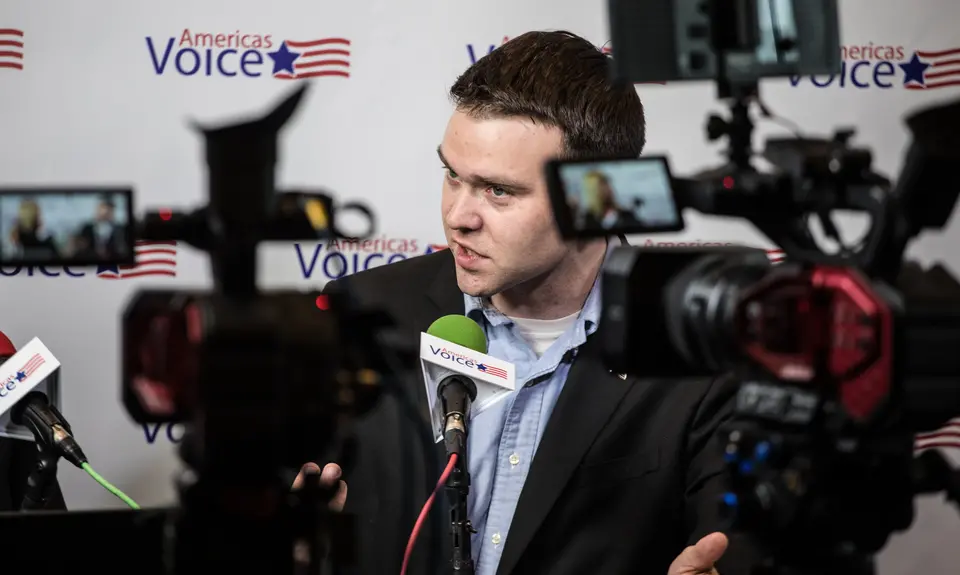California-based conservative think tank The Claremont Institute has been working to define and attack multiculturalism as part of a campaign aimed at shaping national rhetoric ahead of the 2020 presidential election, and its top voices have employed nationalist rhetoric and sought untraditional figures to meet its ends.
The Claremont Institute, founded in 1979, is influential within the conservative movement nationally. The organization’s approach to influencing politics is three-fold: it educates conservative influencers, it publishes the Claremont Review of Books, and it files legal briefs and engages in litigation. In May, Secretary of State Mike Pompeo addressed the organization’s 40th Anniversary Gala in California. Founding Director of the Claremont Institute's Center for Constitutional Jurisprudence John Eastman is a figure that conservatives have often turned to when opposing LGBTQ equality and immigration issues.
Claremont Institute provided early support of President Trump’s 2016 candidacy, including its publication of a now-notorious anonymous essay called “The Flight 93 Election,” which described a potential Hillary Clinton presidency as “Russian Roulette with a semi-auto,” and a vote for Trump as a heroic act on a par with the passengers on September 11, 2001, who rushed the cockpit of their hijacked plane. The Atlantic’s Conor Friedersdorf described the essay at the time as “flagrant sophistry that should embarrass The Claremont Institute.” But instead of feeling ashamed, it appears the organization has ratcheted up its overt support for Trump, and is seeking to intellectualize white nationalist talking points, akin to what Fox News host Tucker Carlson does.
Today we find another work of sophistry on the front page of The Claremont Institute’s website, an article titled “Defend America—Defeat Multiculturalism.” In the essay, Claremont Institute president Ryan P. Williams writes that “today's multiculturalist enforcers seek to erase and replace America,” an echo of the “replacement theory” and assertions of “white genocide” put forward by white nationalist and white identitarian groups around the world. (Last year, Right Wing Watch reported on Tucker Carlson’s appropriation of the theory to assert that black South Africans were seeking to steal the land of white farmers.) A note on the Claremont Institute piece states that the essay is a “launching document” for a Claremont Institute effort “in defense of America against the threat of multiculturalism” ahead of the 2020 general election. Williams writes:
If we do not reverse multiculturalism’s advance, it will continue to undermine our country and constitutionalism, destroying the possibility of a common good and a life of civic peace. Indeed, multiculturalism threatens to take down western civilization as whole.
By multiculturalism, we do not mean the mere presence of many cultures, races, or ethnic traditions, which are a fixture of modern American life and can be found across our states, communities, institutions, and private associations. One of America’s—and Americanism’s—great virtues has always been the maintenance of a wide realm of liberty and civic society in which a vibrant mix of cultural heritages and individual excellence could flourish.
America’s most important politico-cultural virtue, though, has been the insistence to its current—and especially potential—citizens that they assimilate to a certain view of justice embodied in the Declaration of Independence and safeguarded by our state and national political institutions, first and foremost the U.S. Constitution. E pluribus unum (“out of many, one”), America’s motto, means that assimilation has always been in our national DNA.
Williams writes that right-wing conservatives and intellectuals in America “have a disordered view of priorities and policies, of ends and means,” which has led many people on the Right to “misinterpret and underappreciate President Trump’s virtues and his significance as a political phenomenon.” Multiculturalists, Williams continues, pose an existential threat to the nation. Williams writes that Claremont Institute will employ rhetorical campaigns “to fuse civic nationalism with the popular, cultural, and historical touchstones of American greatness.” And over the past few months, its commentators have made clear just what exactly they mean by “American greatness.”
In an episode of Claremont’s Institute’s podcast “The American Mind,” James Poulos says that “social justice dogma” seeks “the wholesale repudiation of American justice as we’ve known it since the Founding.” On the podcast, Williams compares social justice efforts to slavery and Communism during the Cold War. Williams says the analogy “isn’t perfect, but I think, thinking of it that way, at a regime level challenge, is the proper way to think about it.” Multiculturalism, Williams says, threatens to destroy America “and could be the downfall of Western civilization as a whole.” On the same episode of the podcast, Tom Klingenstein, Claremont Institute chairman, claims that multiculturalism “aims at the destruction of America and the West.”
Conrad Black, who was pardoned of fraud and obstruction of justice convictions by Trump earlier this year, wrote at Claremont Institute that “waves of desperate people in the Middle East, Africa, and Latin America who have tried to swarm into Europe and North America more closely resemble, though they are less organized, the barbarian masses who surged into the Western Roman Empire in the fifth and sixth centuries.”
These sentiments published by the Claremont Institute, reverberate with white nationalist philosophy as it was popularized and mainstreamed with the rise of Trump during the 2016 election. The Southern Poverty Law Center notes that fighting multicultural programs has been a common cause of white nationalists and paleo-conservates.
Vox reporter Jane Coaston pointed out that Claremont Institute had selected One America News Network pundit Jack Posobiec, a notorious “Pizzagate” conspiracy theorist with past ties to extreme-right figures, as a Jack Roth Charitable Foundation Lincoln Fellow for 2019. The institute will host Posobiec for a week-long fellowship in August alongside figures working closely with the White House, Capitol Hill, and State Department. Mona Charen at National Review wrote earlier this month that the selection of fellows, including Posobiec, should embarass The Claremont Institute “for beclowning itself with this embrace of the smarmy underside of American politics.”





